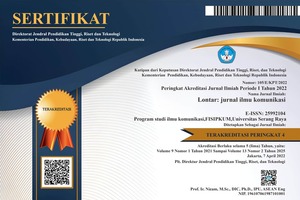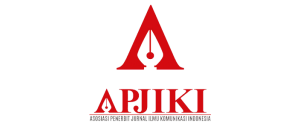Pemberdayaan Laz Harfa Menerapkan Sanitasi Total Berbasis Masyarakat Di Kabupaten Pandeglang
DOI:
https://doi.org/10.30656/lontar.v9i1.2882Abstract
Perilaku buang air besar sembangan (BABS) di Kabupaten Pandeglang Banten masih tinggi, dimana dari 1,23 juta penduduk, 451 ribu orang melakukannya. Kondisi ini cukup memprihatinkan, mengingat BABS membuat pencapaian indikator kesehatan menjadi kurang optimal.
Pendekatan pemerintah dalam membangun sarana dan infrastruktur sanitasi sehat, termasuk pembuatan jamban keluarga, berbasis ketersediaan dana APBD (Anggaran Pembangunan Belanja Daerah). Karena anggaran terbatas, banyak warga miskin tidak mendapat subsidi dalam pembuatan sanitasi lingkungan. Lembaga Amal Zakar Harapan Duafa (Laz Harfa) membuat model pemberdayaan dengan koonsep komunikasi risiko kesehatan dan program kesehatan berbasis advokasi, dukungan sosial, dan pemberdayaan. Model ini mendorong masyarakat miskin mampu membiayai pembuatan sanitasi lingkungan dengan dana mandiri.
Penelitian ini menggunakan metode studi kasus, karena akan mendalami suatu peristiwa pada kelompok tertentu dalam menerapkan Sanitasi Total Berbasis Masyarakat (STBM) di Pandeglang. Untuk menentukan informan, peneliti menggunakan konsep sampling purposeful dengan informan Direktur Laz Harfa Indah Prihanande. Metode pengumpulan data dengan dokumentasi untuk menggali data-data masa lalu secara objektif dan sistematis. Dokumentasi bersumber berbagai berita media lokal seperti Kabarbanten.com dan situs resmi Lazharfa.org.
Temuan penelitian, Laz Harfa menerapkan STBM melalui dua hal yaitu memperkenalkan komunikasi risiko kesehatan dan menjalankan program kesehatan berbasis advokasi, dukungan sosial, dan pemberdayaan berhasil dilakukan di Kabupaten Pandeglang. Pesan komunikasi yang disampaikan melalui program kesehatan dapat mendorong masyarakat miskin menjadi mandiri, termasuk dalam membiayai program-program kesehatan dan program pemberdayaan. Sehingga biaya untuk kebutuhan pembuatan jamban sehat dan permodalan keuangan mikro, dilakukan dengan mandiri, tanpa mendapat subsidi dari Laz Harfa atau pemerintah.
Downloads
Published
Issue
Section
License
By submitting an article to the journal, the author(s) agree to transfer the published article's copyright to the journal, which will act as the publisher. This means the journal will have the right to publish the article in various forms, including reprints. The journal will maintain the publishing rights to the published articles.
In line with the license, authors and third parties (readers, researchers, and others) are allowed to share and adapt the material. In addition, the material must be given appropriate credit, provided with a link to the license, and indicated if changes were made. If authors remix, transform, or build upon the material, authors must distribute their contributions under the same license as the original.






